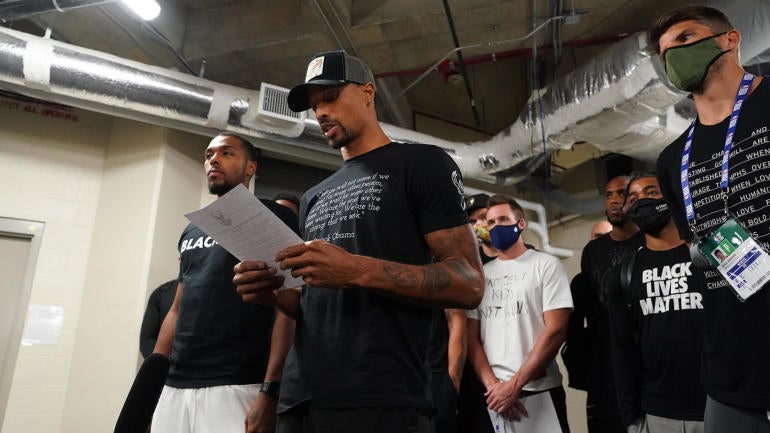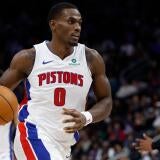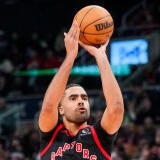'Enough is enough': By walking out, Bucks show what it looks like for NBA players to use their platform
After the shooting of Jacob Blake in Kenosha, Wisconsin, players are demanding action

On Sunday in Kenosha, Wisconsin, police officer Rusten Sheskey shot Jacob Blake seven times in the back, with his children watching in his car. Blake, a Black man, is partially paralyzed. On Wednesday in Orlando, the Milwaukee Bucks chose not to take the floor for a playoff game.
The walk-off has been widely described as a boycott, even by the team itself. Really, it is a wildcat strike. Hours after the scheduled tip-off, Bucks players George Hill and Sterling Brown read a prepared statement to reporters at AdventHealth Arena at Disney's Wide World of Sports Complex.
It read, in part: "We are calling for justice for Jacob Blake and demand the officers be held accountable. For this to occur, it is imperative for the Wisconsin state legislature to reconvene after months of inaction and take up meaningful measures to address issues of police accountability, brutality and criminal justice reform."
Rashad Robinson, the president of racial justice organization Color of Change, took a deep breath when he saw what the Bucks had done. In an interview, he said it was a significant moment, an indication that the culture has shifted. To him, it also illustrated just how much people have had to withstand, in terms of seeing police brutality over and over again.
"I think the team is absolutely right," Robinson said: The Wisconsin state legislature and district attorney need to "actually prosecute and hold police accountable." He then got more specific about policy changes.
"At the state and the federal level, we need to end qualified immunity," Robinson said. "We actually need to seriously deal with the swollen police budgets and the militarization of police. And that money should be divested and invested in things that we know keep people safe and make communities whole. The communities that have a lot of police are not the safest communities in our country. And the communities that have parks and schools and mental health and a whole bunch of other things are oftentimes safer."
Brown, a 25-year-old guard, was tasered, injured and arrested by Milwaukee police officers in January 2018. Less than three months later, the Bucks held their inaugural "Back the Badge Night" to honor local law enforcement. They held another one in March 2019, nine months after Brown sued the city of Milwaukee and its police department, and another one in February 2020, four months after Brown rejected the city's $400,000 settlement offer.
Channing Frye, who retired as a player after the 2018-19 season and is now an analyst for Turner Sports, said that the issue "hits home" for the Bucks because of Brown and a 2015 incident in which ex-Bucks center John Henson was racially profiled at a jewelry store in Whitefish Bay, Wisconsin, and police officers called to the store questioned him about his car. In a league in which 80 percent of the players are Black, there is no shortage of similar stories.
"This is literally somebody's brothers and aunts and uncles," Frye said. "We all have the same story, which is wild. I don't know any Black person that does not have a cop story."
Frye said that he is proud of the Bucks, proud to be an ex-NBA player and excited to be a part of history.
"Enough is enough," he said.
The Bucks' walk-out followed a string of media availabilities in which NBA players and coaches processed trauma on camera in real time. Hill said Monday that "we shouldn't have even came to this damn place, to be honest," as the focus has shifted to the court instead of "what the issues are." On Tuesday, Toronto Raptors guard Fred VanVleet said that "we knew coming here or not coming here was not going to stop anything," but the limitations of their social-justice messaging had been laid bare. VanVleet said that it is "starting to feel like everything we're doing is just going through the motions and nothing's really changing."
Last week saw the release of body-camera footage of an Alameda County sheriff's deputy shoving Toronto general manager Masai Ujiri at Oracle Arena after the team won the 2019 title. Raptors and Boston Celtics players met on Tuesday night and discussed potentially refusing to play Game 1 of their second-round series, which is scheduled for Thursday. Celtics forward Jayson Tatum said Wednesday that players are angry, frustrated and isolated, and they would "love to go back to our communities and stand with our people."
Leading up to the restart of the season, players participated in protests against systemic anti-Black racism and police brutality. They debated on a series of conference calls whether or not they should return to play. VanVleet was among many who felt conflicted: Would playing games help or hurt the cause?
After the Bucks took their stand and the NBA postponed the rest of Wednesday's games, players held an "all-hands" meeting on Wednesday night, in which they discussed the possibility of not continuing the playoffs. They have another meeting scheduled for 11 a.m. on Thursday, the same time that the owners will meet on a board of governors call, per ESPN.
Robinson said he didn't see the Bucks' decision as a radical shift in the players' approach, but rather as an evolution. "People are going to work on the inside and outside," he said, and the players are reacting to what is going on around them.
In speaking with players and coaches across multiple sports, Robinson has seen people "coming to the table time and time again," hoping that everyone cheering for them on the court is really behind them, hoping that they will be heard, hoping that this time will be enough, and having to watch "how the system realigns itself to protect itself and always will make an excuse why it was OK to kill the Black person."
"When these situations continue to happen over and over again," Robinson said, "and when you watch police chiefs and police unions get up and explain away the incident, when you watch the narrative after someone is killed on camera suddenly start to shift where they get put on trial and we don't even know the police officer's name while they're getting their story together, I just don't know what people are expected to do."
Robinson said that "folks should know that they have been pushed to this point." For all the debate about the players' stated goal of using their platform in the NBA bubble, the Bucks' strike is exactly what using a platform looks like.
"They will be part of the news in a way that will in some ways overshadow the Vice President tonight," Robinson said. "And they have the power to do that, and that's important. And they recognize that."
In the locker room in Orlando, Bucks players spoke to Wisconsin attorney general Josh Kaur and lieutenant governor Mandela Barnes, per ESPN. After the evening meeting, there is a growing sense that players will demand owners take action, or the season will be in jeopardy per Sports Illustrated.
"This is how the ball gets moved," Robinson said.


















